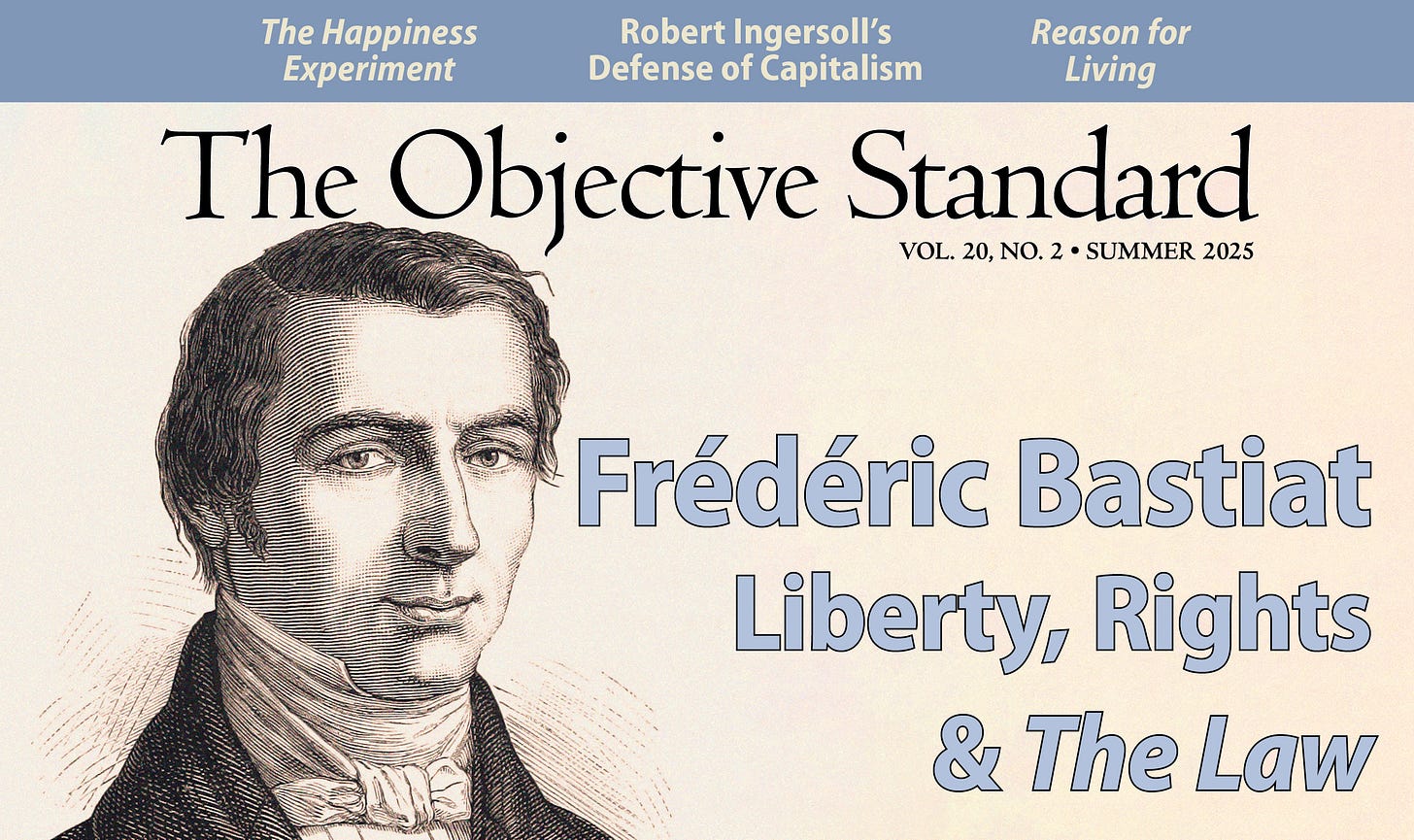The Summer 2025 Issue of TOS Is Published!
Welcome to the Summer 2025 issue of The Objective Standard, the rational alternative to regressivism and conservatism.
Welcome to the Summer 2025 issue of The Objective Standard, the rational alternative to regressivism and conservatism.
Our team is currently hard at work preparing for LevelUp 2025 in Orlando, Florida (July 16–19), where TOS will have a table offering booklet versions of many of our best articles from our twenty-year archive. Several TOS writers will be joining me in speaking at the conference, including Craig Biddle, Angelica Walker-Werth, Timothy Sandefur, Carrie-Ann Biondi, Seamus Riley, and Ligeia Rose. If you’re not already registered, head over to objectivestandard.org/conferences and sign up today!
Now, to the contents of this seventy-eighth issue of The Objective Standard.
In “Frédéric Bastiat: Liberty, Rights, and The Law,” Tom Malone profiles one of the 19th century’s most outspoken defenders of liberty and individual rights. Although Bastiat is renowned for his identification of such economic principles as the broken window fallacy, Malone shows that the real core of Bastiat’s argument for liberty is his moral principles, particularly his advocacy for individual rights.
Continuing with the celebration of great heroes, in “Henry Kaiser: Wartime Producer and Industrial Hero,” Nadav Sternheim—a recent graduate of Objective Standard Institute’s junior fellowship program—profiles this lifelong businessman and dealmaker who helped turn America’s manufacturing industries toward wartime production during World War II.
Then Malone follows up his profile of Robert Ingersoll (see The Objective Standard vol. 13, no. 1 [Spring 2018]) with a new article—“Robert Ingersoll's Profoundly Moral Defense of Capitalism”—detailing this intellectual titan’s lesser-known views on moneymaking and the role of government in business.
Moving into our “Good Living” section, I review Carl Barney’s upcoming book, The Happiness Experiment, which inspired me to write my own “happiness plan” and enabled me to think more precisely about what I want my future to look like.
But why settle for one book on finding happiness through reason when you can have two? Craig Biddle’s review of my recently released book Reason for Living: A Rational Approach to Living Your Best Life is followed by a chapter from the book, republished here as “Adopting Rational Virtues to Achieve Your Goals.”
Rounding out the “Good Living” section, I write about how thinking deeply about my passion for railways helped me identify my fundamental values and enhance my enjoyment of all my passions in “How a Deeper Understanding of Your Interests Leads to a Richer Life.”
Opening the “Politics and Rights” section, Nicholas Provenzo compares Donald Trump’s arbitrary, immoral use of executive orders to true, principled reform in “The DOGE Delusion: Trump’s Power Play vs. Principled Reform,” showing how initiatives such as DOGE can undermine efforts to restrict government to its proper function.
Next up, Michael Dahlen reviews A Black Hole in Economics by Jim Brown, delving into the questions of how money is created, how this affects the economy, and why this process is so poorly understood today.
Reviewing Code Name: Pale Horse: How I Went Undercover to Expose America’s Nazis by Scott Payne, Tim White praises some of Payne’s heroic undercover detective work while also briefly highlighting the importance of rooting law in a proper understanding of rights.
Calling out the harmful ideas behind rights-violating policies is vitally important, and that’s just what the popular self-help figure Ryan Holiday did after he was dis-invited from giving a U.S. Naval Academy talk because he planned to object to Trump’s book-banning mandate. In “Kudos to Ryan Holiday for Standing on Principle,” Angelica Walker-Werth celebrates Holiday’s act of integrity and identifies some of the fundamental ideas it highlights.
Our final section, “The Arts,” opens with Angelica’s review of Sunrise on the Reaping by Suzanne Collins, analyzing the philosophic ideas underpinning the new Hunger Games prequel novel.
Next up I review Andor, created by Tony Gilroy. Easily overlooked in the sea of copy-and-paste Star Wars spin-off shows airing these days, Andor is a true diamond in the rough—a well-written show with an integrated, pro-liberty theme masterfully delivered across its two-season run.
Next, we move from “a long time ago” to a slightly more recent setting—namely, the lifetime of Jane Austen. In her review of Miss Austen, Angelica explores the themes in this BBC miniseries that dramatizes the celebrated author’s life and her relationship with her family.
Last, but not least, White reviews Clair Obscur: Expedition 33—widely lauded as one of the best video games of all time—delving into its fascinating premise, moral theme, gameplay, and more.
That’s it for this issue. I hope you enjoy the articles and reviews. If so, be sure to recommend and share them with friends on social media, in conversation, and especially on Substack. If you have a Substack publication of your own, please recommend The Objective Standard on your home page (see “recommendations” on your dashboard). And if you’ve not yet subscribed to the journal for people of reason, become a subscriber or upgrade your subscription today.
Thank you for your support,
Thomas Walker-Werth
Managing Editor
The Objective Standard
PS. EPUB and PDF versions of this issue will be posted by June 6; audio versions are available in the Substack app.




Has the Summer issue gone out yet?